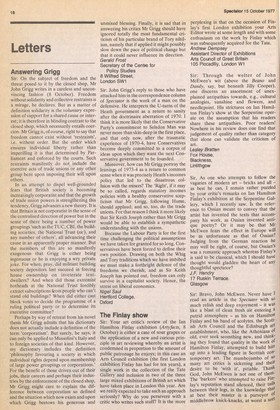Sir: John Grigg's reply to those who have attacked him
in the correspondence column of Spectator is the work of a man on the defensive. He interprets the U-turns of the Heath government as a return to sanity after the doctrinaire aberration of 1970. I think it is more likely that the Conservative Party's commitment to Selsdon Man was never more than skin-deep in the first place, and that only now, after the traumatic experience of 1970-4, have Conservatives become deeply committed to a corpus of ideas upon which they want the next Conservative government to be founded.
Moreover, how can Mr Grigg portray the leanings of 1973-4 as a return to common sense when it was precisely Heath's incomes policy that led to the disastrous collision with the miners? The 'Right', if it may be so called, regards statutory incomes policies with a healthy conservative scepticism that Mr Grigg, following Hume, should applaud; and so, too, do the trade unions. For that reason I think it more likely that Sir Keith Joseph rather than Mr Grigg would be able to establish a sympathetic understanding with the unions.
Because the Labour Party is for the first time challenging the political assumptions we have taken for granted for so long, Conservatives have been forced to define their own position. Drawing on both the Whig and Tory traditions which we have imbibed we must make a forthright defence of the freedoms we cherish; and as Sir Keith Joseph has pointed out, freedom can only survive in a capitalist society. Hence, the stress on liberal economics.
Nigel Saul Hertford College, Oxford


































 Previous page
Previous page